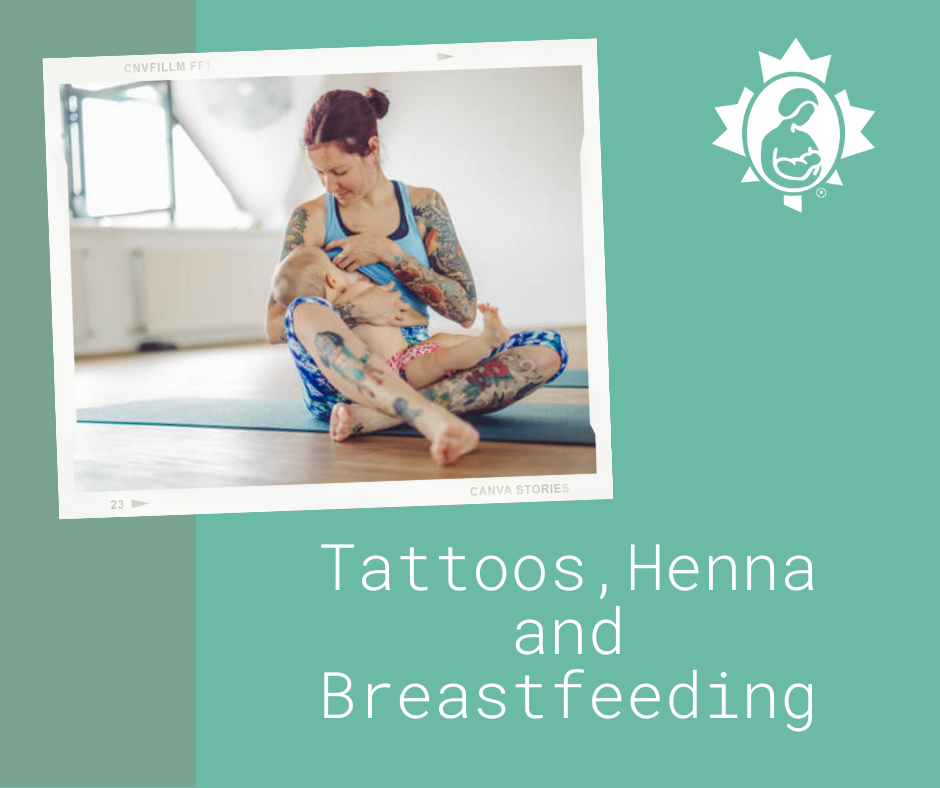
For many people tattoos are an important form of self-expression. As a nursing parent you may wonder if having tattoos or getting a tattoo could impact breastfeeding.
Existing Tattoos
Any existing tattoos that you have will not impact your ability to breastfeed your baby. Many nursing mothers are beautifully decorated with tattoos! It is generally believed that ink molecules are too large to pass into your milk. Thus, it is unlikely your baby would be affected by the tattoo. However, concern has been raised about possible health risks of tattoos. Newer research indicates that some of the chemicals in the ink might pass into your blood slowly over months or years. If this is the case, the effect on your health or your baby’s is unknown. Health Canada does not regulate tattoo inks because they are considered cosmetics.
It may be valuable to know that there are chemicals all around us, in the air we breathe, the food we eat and the water we drink. It is impossible to know where all of our exposure to the chemicals in our bodies comes from. For more information please see Breastfeeding in a Polluted World.
Regardless of what this new research may indicate, breastfeeding remains, without a doubt, the recommended way of feeding your baby.
Getting a New Tattoo
If you are nursing and considering getting a tattoo, the biggest concerns are the possibility of a skin infection, blood infection or an allergic reaction. You may want to wait until your child is at least one year old. Your body needs time to heal from birth. And it is harder for your body to heal a tattoo while it is also working to produce milk. Waiting until after your child’s first birthday means that your child is no longer primarily dependent on your milk for nutrition. Most tattoo artists will not knowingly tattoo someone who is pregnant or nursing for liability reasons. Waiting until your child is completely weaned is the safest option.
Having a Tattoo Removed
Tattoos are removed using lasers that break the ink particles down into smaller particles which are then disposed of by the body through your liver. Having a tattoo removed has similar risks to getting a new tattoo and the aftercare is the same. There is no research to prove whether or not the ink particles are small enough to enter your milk. Again, it is safest to wait until your child is completely weaned before having any tattoos removed.
Temporary Henna Tattoos
Natural henna, from the Lawsonia plant, with no added chemicals, is safe to use to create temporary tattoos while you are pregnant and nursing. Natural henna tattoos last around two to three weeks.
Black henna, on the other hand, should be avoided while breastfeeding. It is often mixed with a chemical called paraphenylenediamine (PPD), which can cause serious allergic reactions including rashes, hives, pain, stomach pain and cramping, and even anaphylaxis (life-threatening allergic reaction). Health Canada does not allow this ingredient in cosmetic products that are used on the skin.
Please consider supporting LLLC.
References:
Health Canada. (2018, September 5). Black henna temporary tattoos. canada.ca.
HMBANA, (2020, September). Standards for Donor Human Milk Banking: An Overview. Fort Worth, TX: Human Milk Banking Association of North America, Inc.
La Leche League International. (2021, June). Tattoos and Breastfeeding.
Schreiver, I., Hesse, B., Seim, C. et al. (2017). Synchrotron-based ν-XRF mapping and μ-FTIR microscopy enable to look into the fate and effects of tattoo pigments in human skin. Scientific Reports, 7, 11395.
Updated 2024
